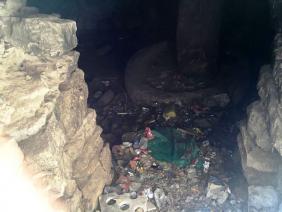'Azzun, Habla, Qaddum
09.30: We set out in the direction of Kadum, to meet S. and hear from him about what has been going on recently in the village. According to him the army has increased the use of live bullets. The soldiers block the way of the demonstrators and do not allow them to advance in the direction of the spot where the road was blocked. The Kadum inhabitants continue to demonstrate on Fridays and Saturdays. There are many wounded among them, some of whom continue coming to the demonstrations despite their injury. S., who has always been optimistic, says that he sees no chance for peace.
S. led us to the ancient part of the village. There are buildings that are over 400 years old. The buildings are not well maintained, but it is evident that they were imposing. There is also an old oil-press, where there is a big round stone. It is difficult to make it out in the dark, and with all the filth. The alleyways are narrow and picturesque. It is really beautiful to walk there, were it not that we know about the conditions of existence of the Kadum inhabitants. Everywhere the villagers stop us and invite us to their homes for coffee, tea, to be their guests. They are friendly and smiling. As always.
An elderly woman tells S. about her difficulties regarding the olive picking at her plot, which is situated exactly in the Kedumim settlement. Only her family members are allowed to accompany her, but her sons are not available for this. She only has a few days to enter with a permit. A difficult reality.
12.00: We drive to Azzun. We bring Z. clothes for his shop. At the entrance to the town there is a military vehicle, and a few soldiers around. Z. says that it is quiet at their place (a few days later this quiet was breached). In the town people are busy repairing the rain damage.
We continue to A.'s plant nursery. He is sad and angry. The soldiers at the Habla gate treat him rudely. He now prefers to cross in the morning by the Eliyahu checkpoint, and only in the evening by the Habla gate. It's a long time since I've seen this nice man so depressed. It seems that the burden of the occupation had begun to subdue him, too. He tells us that the soldiers made him enter the cabin for the security check and told him to undress. He refused. He said he told them that if they forced him to undress completely, he would go out naked in view of everybody. In the end they gave up.
He now has fewer buyers. Israelis are afraid to come. This too is a reason for his sadness. He tells us that one of his customers, an old woman, refused to leave her car. She asked him to load the flowers and drove away. This saddens him. He is known for his hospitality.
13.30: Habla gate.
A military vehicle arrives, in which there are two soldiers, not from the checkpoints unit. They stop next to us and ask what we are doing here. We explain. They have never heard about us. Novices. But nice ones. Still nice.
One of them asks me whether I am not afraid. Again the usual explanations. He says that if his mother or grandmother would wish to come here, he would worry about them. He tells us that at the gate before Habla, where they are coming from, there was an incident of stone throwing on soldiers. "I don't draw my weapon against them," he says, "not even in order to frighten them, but they do throw stones." He doesn't know the number of the gate or what it is called.
13.40: The soldiers open the gate. Within a short time all the people waiting, from both directions, go through. At noon there is no great pressure.
14.00 We part at the Rosh Ha'Ayin train station.

